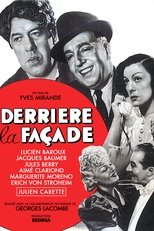Sigmund Kühßeir
Jan 16, 2024
10/10
Behind the Facade (1939)
A crime has been committed in a very respectable Parisian apartment building... Which of the tenants is the murderer? A shocking investigation for a series of sketches. It also features a fabulous cast of stars from the 1930s/1940s: Jules Berry, Michel Simon, Erich Von Stroheim, Elvire Popesco, Carette, Gaby Morlay, Simone Berriau... Lucien Baroux as Commissaire Boucheron, a policeman from the Quariter, who investigates the murder of a building's owner, and Jacques Baumer as Inspector Lambert, from the Sûreté, a more prestigious service than the local police station...
Behind the Facade is undoubtedly one of the most up-to-date and revealing films of the immediate pre-war period, of which Yves Mirande was one of the princes: a man of the theater, a man of wit and a man of the salon, he, like Sacha Guitry, enjoyed every success. His plays triumphed on the boulevard, several were adapted for the screen, he wrote screenplays and dialogues, and sometimes tried his hand at directing.
In 1938, he had conceived and directed the excellent Café de Paris (also directed by Georges Lacombe). A crime film set in this Parisian hot spot on New Year's Eve. Perfectly respecting the classic three-unit rule, it featured a police investigation following the murder of a press magnate. The customers present at the time of the crime, forced to remain on the premises, were successively interrogated, a convenient pretext for the appearance of Mirande's star friends, one after the other and for a few minutes at a time. Jules Berry, Véra Korène, Pierre Brasseur, Simone Berriau, etc.
Café de Paris was a great success on release: the producers and the Régina company immediately asked Yves Mirande to undertake another work based on the same principle: Derrière la Façade, also technically supervised by Georges Lacombe, was even more brilliantly performed: like Guitry, Mirande loved actors, and knew how to make them love him.
The plot is almost the same as in Café de Paris, only the location has changed: this time, the crime is committed in a tenement building, and it's the residents who two rival policemen will try to get to talk to each other in order to uncover the murderer of one of the tenants. Again, a pretext for sketches, but of constant interest: the film is certainly well made, and we have fun recognizing the faces, and there are many of them. Almost all of them are pre-war greats, but through them, Mirande shows the whole of self-satisfied, egotistical society, with its prejudices and pettiness.
As is often the case with fashionable people, Yves Mirande is perfectly placed to be aware of the imperfections of the community in which he lives; if we can't suspect him of having wanted to stigmatize, let alone awaken, the fact remains that he showed here an astonishing, undoubtedly unconscious lucidity. If society is the place where the human comedy is played out, the boulevard, theater or cinema, is its microcosm.
It's no coincidence, for instance, that Erich Von Stroheim's character is featured in Behind the Facade: a German, or more generally an arrogant foreigner, recently naturalized as a French citizen, who shamelessly rips off "real" citizens, is responsible for the stagnation Mirande senses, and whom the film singles out for popular vindication. Obscure feelings, muted anxieties: images of a decomposed France, soon to be brought down by a conflict it dreads but dares not confront. It's the France of Munich on parade, with comedy ministers and bourgeois, cocottes and stuffy aristocrats, in a ballet that closely resembles a dance of death.
